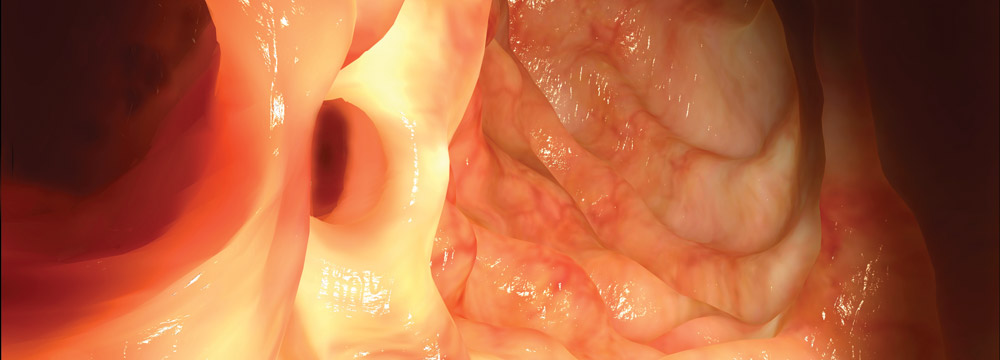
A new approach to diverticulitis
Evidence is fueling new guidelines suggesting internists treat most cases of uncomplicated diverticulitis in an outpatient setting, without antibiotics.
The old way of managing diverticulitis—routine antibiotics for all—is officially on the way out, according to ACP's first two clinical guidelines on the topic.
The College's Clinical Guidelines Committee developed the guidelines on diagnosis and management of patients with diverticulitis, which were published in January by Annals of Internal Medicine.
“ACP's two clinical guidelines are based on the best available evidence on benefits and harms and taking into context costs, patient values, and preferences, and hopefully will help in improving the care of our patients,” said Amir Qaseem, MD, PhD, MHA, FACP, lead author of the guidelines and the College's Chief Science Officer.
In the first guideline, ACP suggested that clinicians initially manage most patients with acute uncomplicated left-sided colonic diverticulitis in an outpatient setting because of a lack of evidence suggesting a benefit of routine hospitalization. The guideline also suggested managing select patients without antibiotics at first, among other recommendations.
“Although the traditional management includes antibiotics, ACP's review of the literature found that evidence did not support their use for uncomplicated diverticulitis and suggests treatment without the use of antibiotics,” noted ACP President George M. Abraham, MD, MPH, MACP, in a video accompanying the guidelines.
The second guideline suggested that clinicians refer patients for a colonoscopy after an initial episode if they have not had the procedure recently. It also strongly recommended against clinicians using mesalamine to prevent recurrent diverticulitis because it has no demonstrated clinical benefits but known harms.
Experts explained the evidence behind the guidelines and offered tips for changing practice around antibiotics and communicating with patients.
A new understanding
Meera Jain, MD, FACP, views diverticular disease as a spectrum, beginning with asymptomatic diverticulosis. Diverticula (without inflammation) are common and affect the majority of Americans older than age 60 years, according to a January 2019 review in Gastroenterology.
Next on the spectrum is mild diverticulitis, involving inflammation of a small area of the intestine, and then more severe diverticulitis, with more intense inflammation and possible abscess formation as well as risk for perforation and death. The “new” thinking is that diverticulitis is an inflammatory process and may not always be an infectious process, said Dr. Jain, a clinician educator for the internal medicine residency program at Providence Portland Medical Center in Oregon.
“In the past, we treated everyone with diverticulitis with antibiotics,” she said. “The well-written ACP guideline summarizes all the data on this condition and reminds us to challenge the dogma of antibiotics for all with diverticulitis. There is a subset of patients who can forgo antibiotics and have no worse outcomes and have less antibiotic exposure.”
ACP's recommendation for selective antibiotic use was based on a systematic review of current evidence that identified five studies, including three randomized controlled trials, that compared the use of antibiotics with no antibiotics in patients with acute uncomplicated left-sided colonic diverticulitis. Low-certainty evidence showed that antibiotic treatment may result in no differences in quality of life, diverticulitis-related complications, long-term recurrence, or the need for surgery compared with no antibiotic treatment.
But the decision to avoid antibiotics in a patient with diverticulitis should only be made under specific circumstances, noted Nick Fitterman, MD, MACP, a member of the Clinical Guidelines Committee and executive director of Huntington Hospital in New York.
“Immunocompetent patients not requiring hospitalization and without evidence of significant inflammation, who are not medically frail, able to tolerate oral intake, and with adequate follow-up capabilities, can safely avoid a course of antibiotics and the potential adverse effects associated with antibiotics, including but not limited to the disruption of their microbiome,” he said.
On the other hand, antibiotics would be appropriate to prescribe for diverticulitis in certain instances, said Jennifer S. Lin, MD, FACP, also a member of the committee and director of the Kaiser Permanente Evidence-based Practice Center in Portland.
“Clinicians should treat with antibiotics when the patient has complicated diverticulitis, has comorbid unstable conditions, is immunosuppressed, or has signs of a systemic inflammatory response,” she said.
Internists could also initially treat with antibiotics when symptoms have lasted longer than five days, the patient cannot tolerate oral intake, and he or she has other significant comorbidities, said Dr. Lin. “Also, patients who initially are managed with conservative care who do not improve or who have new or worsening symptoms should be started on antibiotics.”
The evidence was very uncertain and insufficient about the comparative effectiveness of various antibiotic regimens and durations, according to the guideline. Ciprofloxacin with metronidazole is probably the most commonly used antibiotic regimen for patients with diverticulitis, and amoxicillin and clavulanic acid is a reasonable single agent, said Neil Stollman, MD, an associate clinical professor of medicine at the University of California, San Francisco, and chief of the division of gastroenterology at Alta Bates Summit Medical Center in Oakland, Calif.
He added that there are some data supporting the use of trimethoprim-sulfamethoxazole, rather than ciprofloxacin, with metronidazole. “That's kind of my default these days when I give someone antibiotics. It's inexpensive, narrower in spectrum than cipro, and I think much less toxic than cipro and seems to be equally effective.”
That being said, the gastroenterology world has been moving toward selective use of antibiotics in diverticulitis for several years, noted Dr. Stollman, who was lead author of the American Gastroenterological Association (AGA) Institute's 2015 guideline on the management of acute diverticulitis. In line with ACP's new recommendations, the AGA guideline suggested that antibiotics should be used selectively, rather than routinely, in patients with acute uncomplicated diverticulitis.
“We're the folks who first came out in our little world and said, ‘Stop giving everybody antibiotics [for diverticulitis].’ … That had never been said. It's dogma: You get antibiotics,” said Dr. Stollman.
A clinical practice update of the AGA guideline, published in the February 2021 Gastroenterology, reassessed the topic and found that more recent evidence supported the recommendation to use antibiotics selectively.
“The evidence is getting more and more robust,” said Dr. Stollman, who also serves on the Board of Trustees for the American College of Gastroenterology.
Now even newer evidence has emerged. The DINAMO-study, a randomized controlled trial conducted in Spain, found that in patients with mild acute diverticulitis controlled in the ED, outpatient therapy without antibiotics was noninferior to therapy with antibiotics for reducing hospital admission at 90 days, according to results published in the November 2021 Annals of Surgery.
The study added more evidence from the outpatient setting suggesting that clinicians may be able to forgo antibiotics in healthy patients with mild diverticulitis, who are likely to be experiencing an inflammatory rather than infectious process, said Dr. Jain, who wrote an ACP Journal Club commentary on the study in the February Annals of Internal Medicine. “Most will improve with supportive care and a tincture of time,” she said.
What internists can do
Ultimately, primary care and ED physicians have more power than gastroenterologists when it comes to improving antibiotic prescribing practices for diverticulitis, said Dr. Stollman.
“We're not the first people to see acute diverticulitis, mostly. … The ER doc is making that decision in at least two-thirds of people probably, and primary care docs are seeing people in the office and also making that decision,” he said.
Fortunately, primary care clinicians are already starting to think more deeply about whether antibiotics are indicated, said Dr. Jain. “At least it comes up: Do we give antibiotics or not?” she said. “So the question is there, and then one uses clinical judgment based on a variety of things: patient factors, objective imaging and lab factors.”
But for physicians, it can be challenging to not take action, Dr. Stollman noted. For example, he said it's already routine practice for internists to follow ACP's recommendation to refer patients for colonoscopy after resolved episodes of acute complicated diverticulitis. “That's an easy one to get people to do,” he said. “Because it's doing something; we're all trying to do something. It's weirdly harder to not do something.”
Lack of action can also be hard for patients who've grown accustomed to receiving antibiotics. “American patients have this very strong conception from decades that we've sort of taught them: ‘You have an infection, you get antibiotics, and antibiotics are good,’” Dr. Stollman said. “And that's changing a little bit, but patients often drive this.”
In lieu of antibiotics for mild diverticulitis, internists can provide confidence and contact so that patients know they can reach them in case things get worse, he said. And sometimes, writing an antibiotic prescription can even act as a safety policy.
“I'm not sure I advocate this in a professional sense necessarily, but what I do is I call in a prescription sometimes. I say, ‘Look, I'm going to send the prescription to your [pharmacy]. Give it 24 hours. … If you need it, walk down the street and get your antibiotics. But let's try without,’” Dr. Stollman said.
He added that there are several low-cost interventions to reduce pain during an acute diverticulitis flare-up. “It's a little confusing because we generally want people to eat a lot of fiber, [but] we try to put them on clear liquids for 24 hours. … I sometimes give people a peppermint balm, which helps with spasm and cramps, and I sometimes tell them to put a heating pad or a hot water bottle on their pain,” Dr. Stollman said.
One final thing internists can do is update their advice for managing diverticular disease. For instance, the recommendation to avoid small nuts and seeds because they could get caught in the diverticula was a prevalent myth for decades “and actually, for some primaries, remains the mythology,” said Dr. Stollman.
“We used to tell people, ‘Don't eat popcorn, and don't eat seeds and nuts.’ There's still a lot of people who are not eating those foods,” said Dr. Jain. “When [researchers] actually looked at it in prospective databases, they found that whether you eat the nuts or not had no difference on recurrent diverticulitis, so there's no longer a recommendation to counsel people to avoid those foods.”
Since diverticulosis is a lifelong diagnosis (short of surgery), it's important to provide patients with better lifestyle advice that may lower their risk, said Dr. Stollman.
Five lifestyle factors appear to be key in reducing the risk of future episodes of diverticulitis in those who have the diagnosis, according to a study published in December 2017 by the American Journal of Gastroenterology. An average red meat intake of less than 51 g/d, dietary fiber intake of about 23 g/d, roughly two hours of vigorous physical activity weekly, a normal body mass index, and never smoking were associated with lower diverticulitis incidence in men.
“Each one of those steps was additively beneficial to those patients. So if you did one of them, your risk dropped by X%, and if you did three of them, your risk dropped by XX%,” Dr. Stollman said. “And if you did all five of those things, your risk dropped even further.”
Discussing these lifestyle interventions can turn a negative—not giving antibiotics—into a positive conversation, he said. “So I think as a generalist, as an internist, you're not sunk. You have a conversation to have, and it's a favorable conversation: ‘You will be statistically healthier if you do these things.’”



